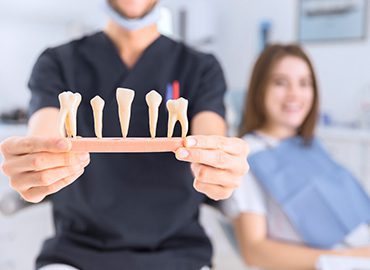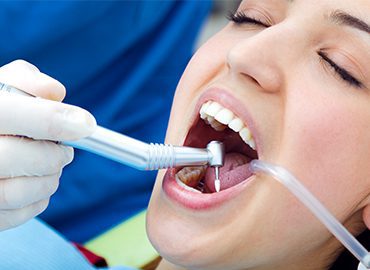Get A Restful Sleep
Sleep Apnea Treatment
It’s estimated that about 10% of Trinbagonian adults are affected by Obstructive Sleep Apnea (OSA), which is the most common form of the condition. Many patients don’t even know that they suffer from this disorder because it is often confused with heavy snoring. OSA prevents restful sleep, which can have a serious impact on your mental health, productivity, and day-to-day life. This disorder can also contribute to an increased risk of heart attack and stroke, so it’s important to get a proper diagnosis right away.
Learn The Basics
What Is Sleep Apnea?
Obstructive Sleep Apnea (OSA) is the most common form of the condition. It occurs when the tissues of the throat and palate relax during sleep. When this happens, the tissue can “sag”, which obstructs the airway and blocks the proper flow of air and oxygen to the lungs. This may occur hundreds of times per night, and last up to 10 seconds or longer during each instance, in some cases.
What To Look Out For
Signs & Symptoms of Sleep Apnea
Sleep apnea has a number of symptoms that are easy to recognize. While heavy snoring is an indicator of apnea, snoring alone is not enough to diagnose the disease. Other symptoms include:
- Gaps in breathing, snorting, or gasping sounds during sleep
- Unexplained headaches
- A sore or dry mouth upon waking
- Insomnia, irritability, and daytime sleepiness
Effects Of Sleep Apnea
OSA and Your Overall Health
Sleep apnea prevents you from getting proper sleep, which can result in issues like irritability, daytime drowsiness, memory loss, and difficulty concentrating. However, the real danger of sleep apnea is that it also increases your risk of heart attack, stroke, and other hear-related issues. This is because the heart does not get properly-oxygenated blood during episodes of sleep apnea. For this reason, you should never ignore apnea or brush it off as a simple snoring problem. If you suspect you or your sleeping partner have OSA, call our team for a diagnosis right away.
Your Treatment Options
Nightguards and CPAP Machines
CPAP (Continuous Positive Airway Pressure) machines are the most common treatment for sleep apnea. These machines provide a continuous, gentle flow of air through a comfortable mask worn during sleep to prevent tissue relaxation and treat apnea. For minor cases of OSA, oral appliances (nightguards) are often recommended. These appliances are designed to move your jaw and throat into a more healthy position, preventing the collapse of oral tissues and helping your breathe properly throughout the night.
Understanding Your Options
How Is Sleep Apnea Treated?
Depending on the cause of OSA, there are a few different ways that the condition can be treated. In some cases, OSA can be treated and resolved with lifestyle and personal health changes, including:
- Obtaining and maintaining a healthy weight
- Avoiding the use of alcohol or drugs that relax the central nervous system
- Quitting smoking to improve the health of the throat, lungs, and airway
- Taking medication to help with nasal allergies
The most common way to treat sleep apnea is with a CPAP machine. CPAP (Continuous Positive Airway Pressure) machines use a nose mask to deliver a gently-pressurized stream of air into the lungs and throat, which prevents tissue sagging, and eliminates sleep apnea. CPAP machines are very effective, but are expensive, bulky, restrict sleeping positions, and require power.
Oral appliance therapy (OAT) is another option. A dentist at My Dental Club can create an oral appliance, which looks similar to a mouthguard for teeth grinding, based on your facial anatomy. This appliance will shift your jaws into a healthy position at night, which prevents airway sagging and sleep apnea. This is a good option for those who have minor-to-moderate apnea.
Surgery for sleep apnea is rare, and usually is only required for patients with very severe cases of OSA. This may include shifting the position of the jaw bone, removing the tonsils and adenoids, or removing tissue from the soft palate.
The Importance Of Proper Care
Why Does Sleep Apnea Need To Be Treated?
Sleep apnea is more than “just a snore.” It’s a very serious sleep disorder, and has a lot of negative effects on your health, both in the short term and the long term.
In the short term, sleep apnea can cause poor-quality sleep and insomnia, resulting in an inability to become properly rested. This can cause other problems like mood swings and irritability, or daytime drowsiness, which can be very dangerous when driving or operating heavy equipment. You may also get daytime headaches, experience a decreased libido, or feel forgetful and foggy throughout the day.
The long-term effects of apnea are even more serious. Because it interrupts proper blood oxygenation and the function of your heart and lungs, sleep apnea can increase your risk of a heart attack or stroke, particularly when combined with other risk factors like obesity, smoking, diabetes, and high blood pressure.
For all of these reasons, treatment from a sleep specialist or a qualified doctor is essential for diagnosing your apnea, and determining the best way to treat it.
Experts In Sleep Apnea Treatment
How Can A Dentist Help?
A dentist at My Dental Club can help you get treatment in a few different ways. We can work with a sleep specialist to diagnose the extent of your apnea, and to look at your facial structure and anatomy to determine what is causing OSA. This allows you to make a more informed decision on how to resolve sleep apnea.
We also specialize in oral appliance therapy at My Dental Club. Working with your sleep doctor, we can craft a comfortable, convenient oral appliance that you can wear at night to prevent apnea.
Oral appliances are small, convenient, affordable, and do not require power, unlike a CPAP machine, making them the best option for most cases of mild-to-moderate apnea. If you need treatment for sleep apnea in Trinidad and Tobago, contact one of our offices in Barrackpore or Freeport right away.
Book a visit to My Dental Club, simply fill out the form below and we will contact you back regarding the intervention you require.




